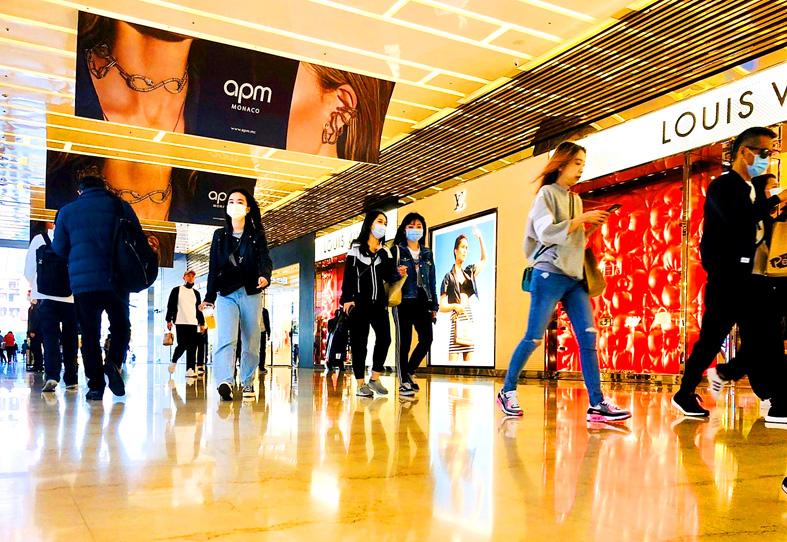Academia Sinica yesterday trimmed its forecast for Taiwan’s GDP growth this year from 3.85 percent to 3.52 percent, while raising its inflation forecast from 2.04 percent to 3.16 percent, saying the economy is losing momentum due to rising consumer prices and other downside risks.
“The economic performance for the rest of this year will not be as smooth and optimistic as previously predicted,” Academia Sinica research fellow Ray Chou (周雨田) told an online news conference, citing an overheating US economy, the Ukraine war, China’s COVID-19 lockdowns and supply chain disruptions.
Global inflation has been rising and major central banks are tightening monetary policy to cool consumer demand and price hikes, Chou said.

Photo: Kelson Wang, Taipei Times
Academia Sinica is the only research body that in December last year forecast a more than 2 percent increase in the consumer price index this year, while other public and private institutes predicted a downhill trajectory.
However, all of the nation’s research bodies and institutions now forecast an inflation of more than 3 percent.
Chou said the central bank would be less active in tightening its monetary policy, causing the New Taiwan dollar to weaken further against the US dollar amid continuing capital flight.
Unfavorable conditions are weighing on the pace of global recovery, although many nations have chosen to live with COVID-19 and lifted disease control measures, he said.
Taiwan’s exports of goods and services, the economy’s main growth driver, could still grow 5.64 percent this year, driven by sustained demand for digital migration and technology innovation by corporations and organizations worldwide, he said.
There is resilient demand for chips used in high-performance computing, data centers and vehicles, but suppliers of electronic components used in smartphones, laptops and TVs are seeing order cancelations and price declines, local technology firms have said.
Local semiconductor firms have largely pressed ahead with capacity expansion plans, boosting private investments, while consumer spending inched up 0.46 percent in the first quarter, Chou said.
Local shipping and airline companies are also aggressively expanding their fleets amid expectations of a recovery in business, he said.
The wholesale price index, a measure of production costs, would likely advance 11.31 percent this year. That would squeeze corporate profit margins unless the companies pass the extra cost burden on to customers, the institute said.
Academia Sinica said it expects the NT dollar to trade at an average of NT$29.17 versus the greenback this year.
The local currency traded at NT$29.914 against the US dollar yesterday.

MULTIFACETED: A task force has analyzed possible scenarios and created responses to assist domestic industries in dealing with US tariffs, the economics minister said The Executive Yuan is tomorrow to announce countermeasures to US President Donald Trump’s planned reciprocal tariffs, although the details of the plan would not be made public until Monday next week, Minister of Economic Affairs J.W. Kuo (郭智輝) said yesterday. The Cabinet established an economic and trade task force in November last year to deal with US trade and tariff related issues, Kuo told reporters outside the legislature in Taipei. The task force has been analyzing and evaluating all kinds of scenarios to identify suitable responses and determine how best to assist domestic industries in managing the effects of Trump’s tariffs, he

TIGHT-LIPPED: UMC said it had no merger plans at the moment, after Nikkei Asia reported that the firm and GlobalFoundries were considering restarting merger talks United Microelectronics Corp (UMC, 聯電), the world’s No. 4 contract chipmaker, yesterday launched a new US$5 billion 12-inch chip factory in Singapore as part of its latest effort to diversify its manufacturing footprint amid growing geopolitical risks. The new factory, adjacent to UMC’s existing Singapore fab in the Pasir Res Wafer Fab Park, is scheduled to enter volume production next year, utilizing mature 22-nanometer and 28-nanometer process technologies, UMC said in a statement. The company plans to invest US$5 billion during the first phase of the new fab, which would have an installed capacity of 30,000 12-inch wafers per month, it said. The

Taiwan’s official purchasing managers’ index (PMI) last month rose 0.2 percentage points to 54.2, in a second consecutive month of expansion, thanks to front-loading demand intended to avoid potential US tariff hikes, the Chung-Hua Institution for Economic Research (CIER, 中華經濟研究院) said yesterday. While short-term demand appeared robust, uncertainties rose due to US President Donald Trump’s unpredictable trade policy, CIER president Lien Hsien-ming (連賢明) told a news conference in Taipei. Taiwan’s economy this year would be characterized by high-level fluctuations and the volatility would be wilder than most expect, Lien said Demand for electronics, particularly semiconductors, continues to benefit from US technology giants’ effort

‘SWASTICAR’: Tesla CEO Elon Musk’s close association with Donald Trump has prompted opponents to brand him a ‘Nazi’ and resulted in a dramatic drop in sales Demonstrators descended on Tesla Inc dealerships across the US, and in Europe and Canada on Saturday to protest company chief Elon Musk, who has amassed extraordinary power as a top adviser to US President Donald Trump. Waving signs with messages such as “Musk is stealing our money” and “Reclaim our country,” the protests largely took place peacefully following fiery episodes of vandalism on Tesla vehicles, dealerships and other facilities in recent weeks that US officials have denounced as terrorism. Hundreds rallied on Saturday outside the Tesla dealership in Manhattan. Some blasted Musk, the world’s richest man, while others demanded the shuttering of his